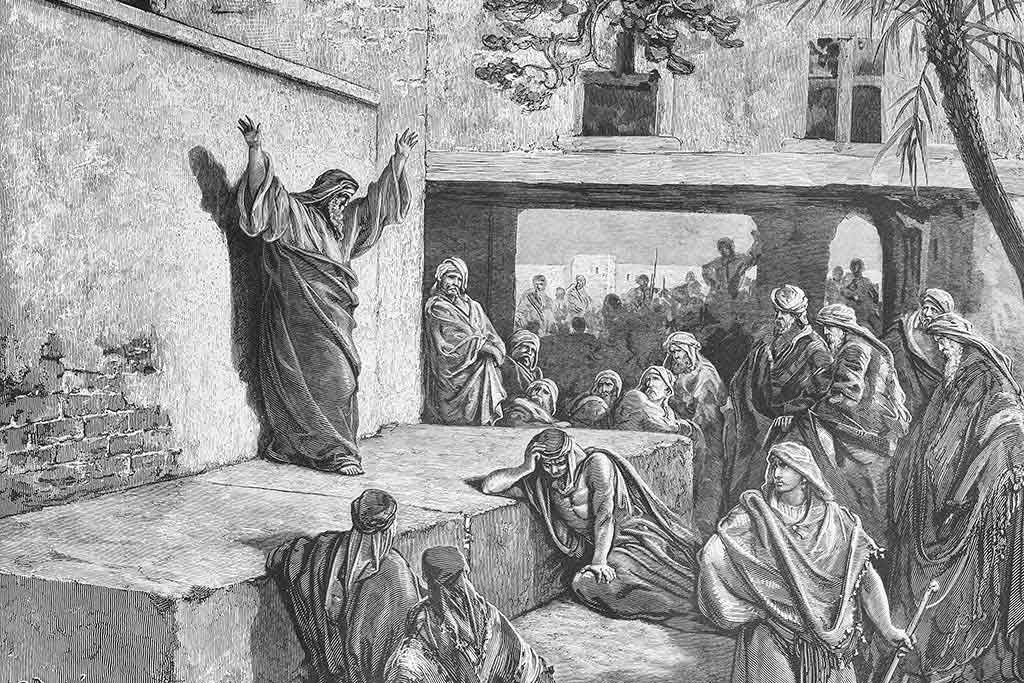
The Meaning of Jeremiah 29:11
The book of Jeremiah gives us an account of the prophetic ministry of Jeremiah, whose personal life and struggles we see more deeply and in more detail than those of any other Old Testament prophet.
The meaning of his name is uncertain. Suggestions include “The Lord exalts” and “The Lord establishes,” but a more likely meaning is “The Lord throws,” either in the sense of “hurling” the prophet into a hostile world or of “throwing down” the nations in divine judgment for their sins.
The story of Jeremiah’s life and message is one of hardship and struggle. The same is true for many Christians today, and one of the verses that many people like to quote, or have framed in their homes, or have tattooed on their wrists, is Jeremiah 29:11: “ ‘For I know the plans I have for you,’ declares the Lord, ‘plans to prosper you and not to harm you, plans to give you hope and a future.’ “
On the face of it, this seems like a harmless reassurance. God is of course a loving God who does chart the course of the lives of those who rely on him. But before we answer this question, let’s look at the background behind Jeremiah’s message and life. As you read the following, evaluate how his life and message impacted the words he wrote to the exiles in this famous verse.
Jeremiah’s Life
Jeremiah’s prophetic ministry began in 626 BC and ended sometime after 586 BC. That places his ministry immediately following that of Zephaniah. Habakkuk was a contemporary, and Obadiah may have been also. And since Ezekiel began his ministry in Babylon in 593, he too was a late contemporary of this great prophet in Jerusalem.
The Lord commanded Jeremiah not to marry and raise children because the impending divine judgment on Judah would sweep away the next generation (Jeremiah 16:1–4). This was likely not the kind of life Jeremiah would have chosen. In fact, there were times when he was like the prophet Jonah in that he was reluctant to bring the messages God commanded to the people of Jerusalem. Still, the pressure of his God-given duty demanded a release, as the prophet himself declared in Jeremiah 20:9:
But if I say, “I will not mention his word
or speak anymore in his name,”
his word is in my heart like a fire,
a fire shut up in my bones.
I am weary of holding it in;
indeed, I cannot.
Primarily a prophet of doom, Jeremiah attracted only a few friends. His message of judgment and exile into a foreign land was obviously not well received by the proud people of Jerusalem. How and when Jeremiah died is not known; Jewish tradition, however, asserts that while living in Egypt he was put to death by being stoned (compare Hebrews 11:37).
Given to self-analysis and self-criticism (Jeremiah 10:24), Jeremiah reveals a great deal about himself in the book that bears his name. Although timid by nature (Jeremiah 1:6), he received the Lord’s assurance that he would become strong and courageous (Jeremiah 1:18; 6:27; 15:20). In his “confessions” (see Jeremiah 11:18–23; 12:1–4; 15:10–21; 17:12–18; 18:18–23; 20:7–18) he laid bare the deep struggles of his inmost being, sometimes making startling statements about his feelings toward God (Jeremiah 12:1; 15:18). Jeremiah, so often expressing the anguish he had in his spirit because of his message from God (Jeremiah 4:19; 9:1; 10:19–20; 23:9), has rightly been called the “weeping prophet.” But it is also true that the memory of his divine call (Jeremiah 1:17) and the fact that the Lord frequently reaffirmed of his calling as a prophet (see, e.g., Jeremiah 3:12; 7:2,27–28; 11:2,6; 13:12–13; 17:19–20) made Jeremiah fearless and faithful in the service of his God (compare Jeremiah 15:20).
Theological Themes and Message of Jeremiah
Referred to frequently as “Jeremiah the prophet” in the book that bears his name (Jeremiah 20:2; 25:2; 28:5,10–12,15; 29:1,29; ) and elsewhere (2 Chronicles 36:12; Daniel 9:2; Matthew 2:17; 27:9; see Matthew 16:14), Jeremiah was always conscious of his call from the Lord (Jeremiah 1:5; 15:19) to be a prophet.
As such, he proclaimed a message given him by God himself (Jeremiah 19:2); a message that was certain to be fulfilled (Jeremiah 28:9; 32:24). Many of his own predictions were fulfilled in the short term (e.g., Jeremiah 16:15; 20:4; 25:11–14; 27:19–22; 29:10; 34:4–5; 43:10–11; 44:30; 46:13), and others were—or will yet be—fulfilled in the long term (e.g., Jeremiah 23:5–6; 30:8–9; 31:31–34; 33:15–16).
As hinted earlier, an aura of conflict surrounded Jeremiah almost from the beginning. He lashed out against the sins of his countrymen (Jeremiah 44:23), condemning them severely for their idolatry (Jeremiah 16:10–13,20; 22:9; 32:29; 44:2–3,8;17–19,25)—which sometimes horrifyingly involved sacrificing their children to foreign gods (see Jeremiah 7:30–34). But Jeremiah loved the people of Judah in spite of their sins, and he prayed for them (Jeremiah 14:7,20) even when the Lord told him not to (Jeremiah 7:16; 11:14; 14:11).
Judgment is one of the most pervasive themes in Jeremiah’s writings, though he was careful to point out that repentance, if sincere, would postpone the otherwise inevitable judgment that was coming from God. He counseled the people of Judah to submit to Babylon, promising “life as usual” for the exiles. This branded him as a traitor in the eyes of many. But actually, of course, his advice not to rebel against Babylon marked him as a true patriot—a man who loved his own people too much to stand by silently and watch them destroy themselves. By warning them to submit and not rebel, Jeremiah was revealing God’s will to them—always the most sensible prospect under any circumstances.
We see some of that will declared in the verses surrounding the passage in question in this article. The context of Jeremiah 29:11 sheds insight on what Jeremiah thought about God.
For Jeremiah, God was ultimate. The prophet’s theology saw the Lord as the Creator of all that exists (Jeremiah 10:12–16; 51:15–19), as all-powerful (Jeremiah 32:27; 48:15; 51:57), and as everywhere present (23:24). Jeremiah ascribed lofty attributes to the God whom he served (Jeremiah 32:17–25), viewing him as the Lord not only of Judah but also of the nations (Jeremiah 5:15; 18:7–10; 25:17–28; chapters 46–51).
At the same time, God is very much concerned about individuals and their accountability to him. The undeniable relationship between sin and its consequences, so visible to Jeremiah as he watched his beloved Judah in her death throes, made him a fiery preacher (Jeremiah 5:14; 20:9; 23:29) of righteousness, and his declarations have lost none of their power with the passing of the centuries.
Jeremiah’s words might make it seem to us that that the end had come, that Israel’s stubborn and rebellious heart had sealed her final destiny, that God’s chosen people had been cast off, and that all the ancient promises and covenants God had made with his people had come to nothing.
But God’s judgment of his people (and the nations), though terrible, was not to be the last word, the final work of God in the history of his people. The message of Jeremiah promised that mercy and covenant faithfulness would triumph over wrath. Beyond the judgment would come restoration and renewal.
Jeremiah 29:11 and Today
With this history and background in mind, let’s take a look at the actual context of this passage, a favorite of so many Christians today.
This verse is couched within a letter that Jeremiah wrote to the exiles who were living in Babylon. As we’ve said previously in this article, Jeremiah was called by God to advise his people to willingly submit to Babylon as a self-protective act. Following God’s will in this matter would allow the survival of many more of the people of Judah than would live should they resist.
This was part of God’s plan for his sinful people. He had warned them many times throughout the centuries to turn from their wicked ways and live (see Ezekiel 33:11). The stubborn people of Judah, confident in their historical protection from God’s righteous anger, had refused.
So this letter came to an exiled people who were battered, defeated and disillusioned. Many in our modern society today can claim the same state of mind, which is why the passage in question sounds so appealing:
This is what the Lord says: “When seventy years are completed for Babylon, I will come to you and fulfill my good promise to bring you back to this place. For I know the plans I have for you,” declares the Lord, “plans to prosper you and not to harm you, plans to give you hope and a future. Then you will call on me and come and pray to me, and I will listen to you. You will seek me and find me when you seek me with all your heart. I will be found by you,” declares the Lord, “and will bring you back from captivity. I will gather you from all the nations and places where I have banished you,” declares the Lord, “and will bring you back to the place from which I carried you into exile” (Jeremiah 29:10-14).
A close look at the context of this favored statement clearly shows that this message was sent specifically to the defeated and exiled people of Judah living in a foreign land. Those who heard this message were undoubtedly comforted by its message, as many are today.
As the old saying goes, “The Bible was written for us, but not necessarily to us.” That is certainly true with this passage. And while many purists will rail that this particular passage is the “most misquoted Bible verse in history,” rolling their eyes in the aisles of home décor stores as they see this verse beautifully framed for use in a thousand family rooms, we can make two definitive statements about this passage that can perhaps add some clarity to the debate:
1. Jeremiah’s message, and thereby the promises included in this passage, were indeed written to a specific people at a specific time and in a specific situation. It’s true that God’s message in this chapter was directed at his exiled people, and that the promise in verse 11 pointed to the 70-year exile that he had prophesied through Jeremiah. He wanted to communicate that his wrath over sin had an expiration date, and that those who sought to be reconciled to him in their hearts and minds would experience the promises resident in this verse.
2. The God who made these promises to a battered and disillusioned people in the Old Testament is the same God who makes these promises to battered and disillusioned people today in a new way—through the lens of the life, death and resurrection of his Son Jesus Christ. God does not change, nor do his promises to his people go unfulfilled. Those who sincerely seek him will indeed find him. Those who follow the message of the Bible and look to God exclusively for their salvation will find that he is a God who keeps his promises; a God who cares about the present and future status of his followers; a God who promises eternal life and fellowship with him to those who will believe.
So can we take this verse to heart as a promise to us today? The answer comes as we look at the context of the verse itself and apply it to our daily lives and practice.
• Are we seeking out a relationship with a saving God?
• Are we praying to him in our difficulties, asking for help and seeking his direction?
• Are we placing our trust in the good promises from God that we find in the rest of the Bible?
• Are we inviting his Holy Spirit to transform us daily into people who do his will and follow his way?
If so, then yes, the God who reached out to his people in exile will indeed reach out to us in our own struggles and difficulties. We can count on the unmerited grace and mercy of our God to apply to us today as well as it did to the ancient people of Judah.
Parts of this article have been adapted from the NIV Study Bible © 1985 by Zondervan. Used with Permission.
By Mike Vander Klipp, a senior editor with the Zondervan Bible Group, where he’s been privileged to work for the past three decades. He and his family live in Grand Rapids, Michigan.

NIV Study Bible, Fully Revised Edition
The NIV Study Bible, Fully Revised Edition, gives you just the right amount of study helps exactly where you want them. The study Bible millions have come to trust is now fully updated, guiding your steps as you confidently venture into Scripture.
Learn More





